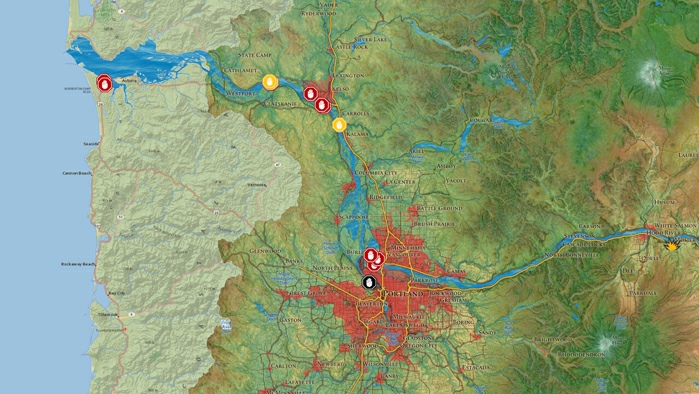Press Release
Maps are power—whether in the colonial era, or in today’s imperial system. But how can they be deconstructed, reconfigured, shared among multiple actors and used to chart alternative futures? How can they embrace the processual flow of time and the multiplicity of embodied viewpoints? Can digital maps still reveal the territory? Can maps of power become pathways of liberation?

International Archives 2nd half of 2024
Brian Holmes, Rivermap - Collaborative Cartographies
Künstlerhaus Stuttgart (Germany)
28.09.2024 - 22.03.2025

Brian Holmes has spent the last decade developing an online mapkit for issues in political ecology, while simultaneously engaging in his favorite research activity: roaming around the riverine landscapes of the American Midwest, the Pacific Northwest coast and the La Plata Basin in South America (he often jokes about “cartography with your feet”). Holmes was previously known in European art and activist circles as an essayist and public speaker, and over the course of these years he has invented a new but strangely familiar genre, the essay map, filled with written text, scientific visualization and multimedia imagery. Each of his projects develops its own conceptual frame, narrative structure, visual style and metaphorical register, expressive of an inquiring subjectivity. Yet at the same time, each of them stems from a territorial dialogue, with multiple inputs from artists, specialists, local inhabitants and social movements, all touched in one way or another by aspects of the non-
Künstlerhaus Stuttgart does not hold traditional exhibitions, but instead seeks to create permeating moods or “atmospheres.” The idea is to let a mode of expression drift away from its immediately tangible forms, into relationships, vocabularies, daily rounds and common resources. Atmospheres emerge slowly, in the transition from season to season, a bit like a garden that germinates under bare earth and yields a multiplicity of fruits at harvest time. Rivermap has been conceived on this seasonal timeline. It begins at the moment of the autumn equinox, in a little corner of an expansive fourth-
Learning from Cascadia sets the tone. The project—not a simple map but a full-
Atmospheres are synonymous with mutability. In November the exhibition will change shape to include the eco-
Curatorial proposal by Tamarind Rossetti and Stephen Wright.
Festival 28 September 2024 -

Brian Holmes, Learning from Cascadia, 2018.

© ArtCatalyse International / Marika Prévosto 2024 All Rights Reserved